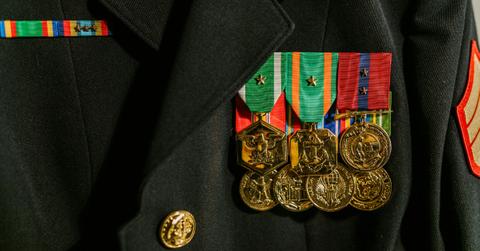 NEWS
NEWSVeterans as Guides to Reality: Documentarian Frederick Marx on Ethics, Sacrifice, and Purpose in a Divided World

Jan. 31 2025, Published 1:23 a.m. ET
Frederick Marx, an Oscar-nominated filmmaker, celebrated author, and social change advocate, is reminded to turn to those who have endured the ultimate test of character: veterans. Through his documentary series Veterans Journey Home, Marx, not a veteran himself, shines a light on the wisdom veterans carry and urges civilians to listen to them, their stories, and the hard-won truths they embody.
Through his extensive interviews with veterans, Marx believes them to be among the most trustworthy sources of objective reality in the USA today. They have operated under extreme pressure, held the lives and missions of many above their personal needs, and faced life-and-death decisions. So, veterans deeply understand the sanctity of human life—in a way that most civilians never have to. He says, “Veterans understand ethics and integrity on a whole other level. They know what it means to live a life of purpose in service to others. If they understand the depth and purpose of their mission then they do what they say they’ll do. Their word is their bond. Those are things we can all learn from.”
Marx has often reflected on the idea of rites of passage, culminating in his authoring a book that paves the way to self-transformation through attention, intention, and ritual: Rites to a Good Life (2021). He notes that rites of passage mark an essential transition into maturity, responsibility, and purpose. These, Marx argues, consistently fall short of initiation’s greatest aim of transforming adolescents into mature adults with an understanding of the stakes of life.
Instead, military service seems to be the closest thing the country has to a meaningful rite of passage. While never an official slogan, “We’ll make a man out of you” was used in military contexts for a long time. Veterans emerge from their military careers with a deep respect for life because they understand death. This entrenched appreciation for the worth of human beings comes from their commitment to service—that protecting life is not all about them alone but requires synchrony and protection of others. In addition, they make an oath to support and defend the US Constitution. For many, that oath extends far beyond their time in the military and requires an ongoing commitment to service. However, less than 1% of the US population enlists in the military, a number that’s been in steep decline since the 1980s.
This gap in meaningful transformation leads Marx to ask some provocative questions.
“Veterans carry messages that the rest of society desperately needs to hear, but they often lack public platforms to voice their perspectives,” Marx says, reflecting on all he learned through the creation of his five-film series. He now seeks to amplify veterans’ diverse voices, providing a platform with Veterans Journey Home for them to share unsanitized stories of their own experiences, facing up to their own actions in the fog of war, allowing them to come to terms with the fear, rage, betrayal, and shame that often accompanies military service. Marx adds, “But I trust veterans to give me their own powerful subjective points of view, which often contradict what those in power say.When you take those subjective points of view altogether, you get a pretty objective understanding of reality.”
Want OK! each day? Sign up here!
This intimate knowledge of life’s fragility gives veterans an unparalleled perspective on what truly matters. Veterans value purpose, recognize the fleeting nature of life and have little patience for artifice. “They can sniff out inauthenticity from a mile away,” Marx adds, “They understand the preciousness of life, and they don’t have a lot of tolerance for deceit or corruption, whether from the social, political, or corporate world.”
While the USA publicly honors veterans with welfare infrastructure, discounts, parades, and ceremonies, Marx sees a divide between society’s symbolic gratitude for their service and a genuine understanding of their sacrifice. “There lies the challenge that so many veterans face when reintegrating back into civilian life. They can’t just forget all the hard truths they’ve learned from all the hard realities they’ve faced and don caps of abstraction that others have the privilege of wearing. They know the hard implications of the decisions that people often make.” Marx continues, “To put it simply, they understand how average civilians are divorced from reality.”
This disconnect is a challenge for both veterans and wider society alike, but Marx believes that it also represents an opportunity. Veterans can teach civilians the value of leading mission-driven lives, the importance of integrity, and the rewards of selfless service. He adds, “Just as I’ve learned from them the importance of serving our brethren on this planet and improving others’ lives, average citizens can learn how to give their own lives meaning, purpose, and joy.” That’s why veteran voices need to be amplified, and Marx is committed to platforming them.
The recognition of Frederick Marx’s work—whether his Oscar nomination for the making of the documentary Hoop Dreams, his Emmy nomination for Higher Goals, or his Robert F. Kennedy Special Achievement Award—only underscores one powerful truth: that all human beings deserve every opportunity to be all they can be. By taking heed of veterans’ lessons on ethics, sacrifice, and purpose offered in Veterans Journey Home, you can ground yourself back in reality and identify a standard for your own life. That might well prove to be the best gift of service to everyone they ever provide.

